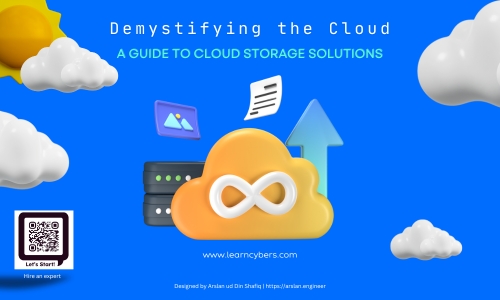The digital age has brought an explosion of data. From personal photos and documents to business records and scientific archives, our need for reliable and scalable storage grows ever greater. This is where cloud storage solutions come in, offering a flexible and accessible way to store your data online.
Table of Contents
Understanding Cloud Storage
Cloud storage refers to the practice of storing data on remote servers managed by a cloud storage provider. Imagine a vast network of interconnected servers that act as a giant virtual hard drive accessible from anywhere with an internet connection.
Unlike traditional physical storage devices, cloud storage offers several advantages:
Scalability:
Easily adjust storage capacity to meet your evolving needs, adding or removing space on demand. For example, if you need 100GB at a time and 1000GB in next hour, and again you wish to reduce it back to 100GB or as per your newer needs, you can do in few clicks. You only pay for what you use.
Accessibility:
Access your data from any device, anywhere in the world, as long as there’s an internet connection.
Security:
Cloud providers offer robust security measures, including encryption and access controls, to safeguard your data.
Durability:
Data is replicated across multiple servers, minimizing the risk of loss due to hardware failure.
Cost-Effectiveness:
Eliminate the need for expensive physical storage infrastructure and its ongoing maintenance.
Technical Details: Diving Deeper
Cloud storage services utilize object storage, a method that stores data in objects – essentially self-contained packages containing the file itself and additional metadata (information about the file). Objects are independent, allowing for flexible management and scalability.
Here are some key technical aspects to consider:
Storage Classes:
Cloud storage providers typically offer different storage classes with varying access speeds and costs. Frequently accessed data can be stored in high-performance tiers, while archived data can reside in more economical, but slower, tiers.
Data Consistency:
This refers to how consistently data is updated across different locations. Some services offer strong consistency within a region but may require specific configuration for consistency across regions.
APIs (Application Programming Interfaces):
APIs allow cloud storage to integrate seamlessly with applications, enabling automated data transfer and management.
Open Source Champions: Free Cloud Storage Solutions
While many leading cloud storage providers offer paid plans with extensive features, there are also open-source options available:
Nextcloud:
A popular self-hosted cloud storage solution offering secure file storage, collaboration tools, and customization options. However, it requires technical expertise to set up and maintain.
ownCloud:
Another self-hosted option with a focus on privacy and user control. Similar to Nextcloud, it demands some technical knowledge for deployment.
Seafile:
Offers strong encryption and collaboration features, making it suitable for teams. However, its user interface may seem less intuitive compared to commercial solutions.
It’s important to remember that open-source solutions often require upfront setup and ongoing maintenance, which may not be ideal for everyone.
Weighing the Pros and Cons: Advantages and Disadvantages
Advantages:
- Scalability and Flexibility: Easily adapt storage to your needs without hardware limitations.
- Accessibility and Convenience: Access your data from anywhere, anytime, on any device.
- Security and Reliability: Cloud providers offer robust security measures and data redundancy for peace of mind.
- Cost-Effectiveness: Eliminate the need for physical storage infrastructure and its ongoing maintenance.
- Disaster Recovery: Cloud storage safeguards your data from physical disasters like hardware failures.
Disadvantages:
- Vendor Lock-In: Switching cloud providers can be complex due to data migration challenges.
- Internet Reliance: Consistent internet access is necessary to access and manage your data.
- Security Concerns: While cloud providers offer security features, entrusting your data to a third party carries inherent risk.
- Potential Costs: Depending on your storage needs, costs can accumulate, especially with premium features or large data volumes.
Top Cloud Storage Providers: Beyond the Big Three
While Amazon Web Services (AWS) S3, Microsoft Azure Blob Storage, and Google Cloud Storage are major players, there are other compelling options:
- Alibaba Cloud OSS: A secure and scalable object storage service offered by Alibaba Cloud, particularly attractive for businesses operating in Asia.
- Dropbox: A popular choice for personal and business use, offering user-friendly features and integrations with various applications.
- Backblaze B2: Known for its competitive pricing and focus on data security, making it a good option for backups and archives.
The best cloud storage provider depends on your specific needs and priorities. Consider factors like budget, data access patterns, desired features, and level of technical expertise required.
By understanding the technical aspects, exploring open-source options, and evaluating leading service providers like Alibaba Cloud, you can make an informed decision and leverage the power of cloud storage solutions for your data needs. Remember, the ideal cloud storage solution should be secure, scalable, and seamlessly integrated with your workflow.
You can hire an expert for technical consultation, assistance and services related to Cloud Computing.

WhatsApp
Scan with your camera
or
Type +1 (307) 2050-454

